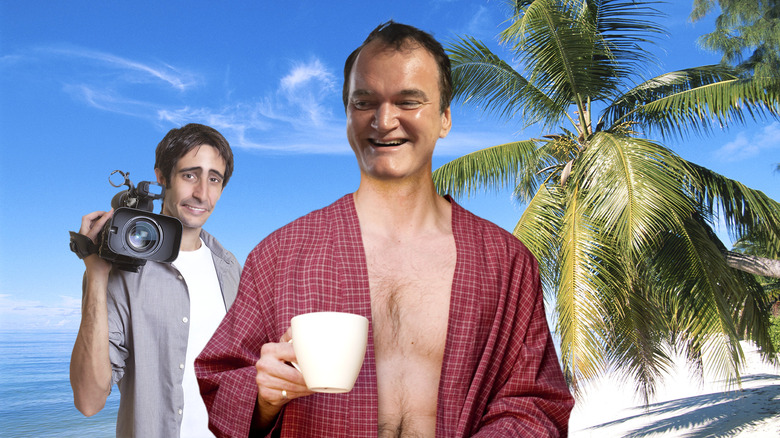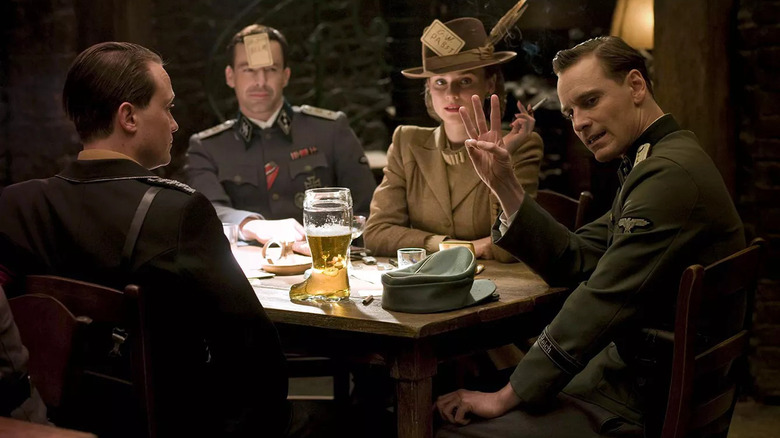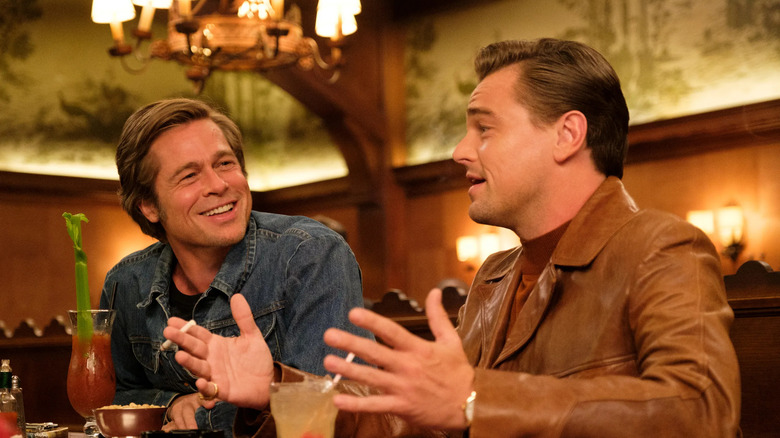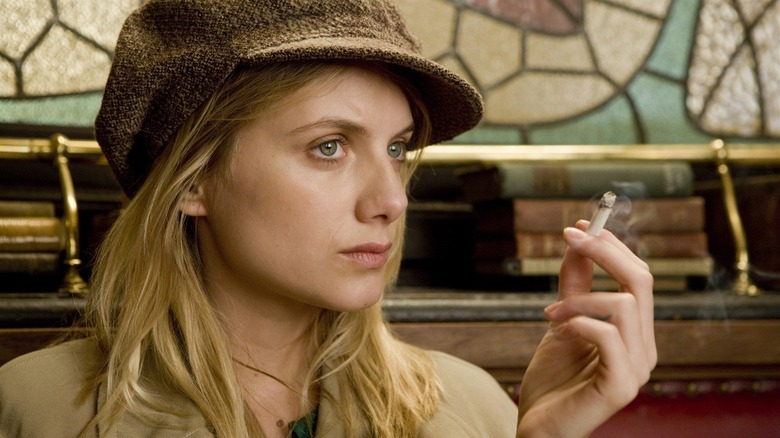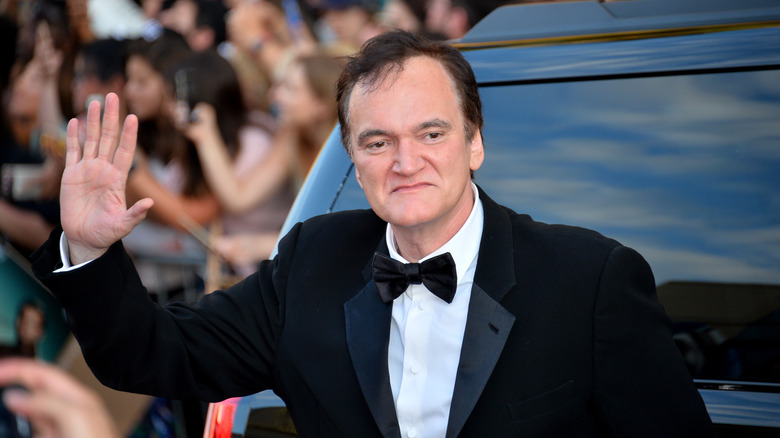Quentin Tarantino's 10th Movie Is Finally Happening, And Please God, May It Truly Be His Last
There are a lot of words one could use to describe writer, director, and producer Quentin Tarantino, and one of them is actually two words: "A lot." Ever since getting his start with "Reservoir Dogs" in 1992 and "True Romance" in 1993 (for which he wrote the script but didn't direct), Tarantino has become a household name for both casual filmgoers and film dorks you try to avoid at parties alike.
Fans and detractors of Tarantino were likely both surprised, then, when he first announced that his upcoming 10th film would be his last one (and before you start yelling about how he's already made 10 films, here's a technicality for you: Tarantino considers both volumes of "Kill Bill" to be one movie). Currently using the working title "The Movie Critic" and said to be about famed critic Pauline Kael, there's not a lot of information out there about Tarantino's alleged final film.
Now, whether or not Tarantino actually packs up his director's chair after "The Movie Critic" remains to be seen. Frankly, though, he definitely should.
There's a reason why Tarantino's movies might have suffered lately
Nobody here is saying that Tarantino hasn't made some truly excellent films. "Pulp Fiction" definitely got snubbed at the 1995 Oscars, as it obviously should have beaten "Forrest Gump" for best picture. Both halves of "Kill Bill" are powerhouses in totally distinct yet tonally symmetrical ways. "Inglorious Basterds" is one of the best movies of the 2000s without question.
But after that? After that is where things get a little sticky.
The potential reason behind the Tarantino downslide is actually pretty tragic. In September of 2010, Tarantino's editor Sally Menke went briefly missing during a hike with her dog, only for police to find her body a day after she left her house with her cause of death confirmed as related to the heat (an even sadder detail: her dog survived, but was found next to Menke's body). An Academy Award nominated and BAFTA-winning editor, Menke worked on every single directorial effort from Tarantino and was a constant presence in his career. His actors even had a tradition of saying "Hello, Sally!" into the camera at the end of their takes.
Why are Tarantino's post-Basterds movies just not as good?
Menke's death was a tragedy on every imaginable level, and her talents as an editor will be remembered forever in Tarantino's early movies. Without her, it can certainly be argued — and will be argued here — that his films noticeably slipped in quality. It definitely seems like Menke was one of the few people who could keep the headstrong director in check. His first movie without Menke was 2012's "Django Unchained" (which was dedicated to her), which is ... uneven, to say the least, thanks to a messy bloodbath of a third act that somewhat betrays the more thoughtful action of the first two.
Things only get messier and lengthier and, honestly, more self-indulgent from there. Critics weren't totally on board with 2015's "The Hateful Eight," and with a run time of 168 minutes, it definitely seemed less edited than his previous efforts. For contrast, "Django" had a run-time of 165 minutes, and though "Basterds" runs for 153 minutes, this epic story is tightly edited by Menke. Also, "Reservoir Dogs" is 99 minutes long.
Finally, 2019's "Once Upon a Time... in Hollywood," which boasts a run time of 161 minutes, is Tarantino's most navel-gazing effort yet, making enemies of Bruce Lee's daughter and reimagining history just like he did in "Basterds," but with seriously diminishing returns.
A female film critic definitely isn't a good focus for Tarantino's talents
The announcement that Tarantino would focus his final film on Pauline Kael, perhaps the most influential female film critic in history, is interesting — but also, potentially problematic. Tarantino's movies have taken radically different approaches to their female characters, with some much more successful than others. Unfortunately, his recent track record is the one that's a bit lacking.
Jackie Brown (Pam Grier), Beatrix Kiddo (Uma Thurman) from "Kill Bill," and both Bridget von Hammersmark and Shosanna Dreyfus (Diane Kruger and Mélanie Laurent) from "Inglourious Basterds," it can and should be argued, are the most powerful people in their stories. In the case of "Basterds," it also can and should be argued that without Bridget's diversions and Shosanna's string-pulling behind the scenes, the Basterds would completely fail in their mission to bring down the Third Reich and kill Hitler. From there, though, Tarantino's treatment of women becomes pretty lacking.
Kerry Washington, a powerhouse performer, is relegated to damsel in distress territory in "Django," an object that Jamie Foxx's titular character has to rescue over and over again. Most galling is "Once Upon a Time... in Hollywood," where Margot Robbie's Sharon Tate barely speaks ... and no woman speaks in the movie for the first fifty minutes. Quick reminder: Margot Robbie has two Academy Award nominations. This is pretty insane, whether or not you, as Tarantino put it, "reject [the] hypothesis."
Will Tarantino even retire, or is this all a ruse for attention?
All of this is pure conjecture, in the end, because whether or not Tarantino actually sticks to his word and retires after 10 movies is still an enormous question mark. Tarantino definitely likes being in the spotlight — after all, his bombastic, often acerbic personality looms just as large as his body of work when it comes to his image. Is he really going to give that up and go, like ... live on a farm with a screening room or something?
Plus, celebrities in various fields pretend they're retiring all the time, only to mount comebacks for — you guessed it! — attention. Jay-Z has retired and un-retired a whole bunch of times. Tom Brady just fumbled his attempted retirement so badly that Gisele Bundchen dumped him. Barbra Streisand said she'd stop performing live in the 2000s, but returned in the 2010s, and Cameron Diaz retired from acting to make wine only to sign onto an upcoming Jamie Foxx movie. Let's not forget Hugh Jackman, who keeps finding loopholes within Wolverine's linear narrative to continually return to the character after "retiring" him in 2017's "Logan."
Tarantino might not actually retire. He might retire from film and start working in television now that everyone's figured out it's just as good as film, if not sometimes better. Hell, he might start a YouTube channel. Only time will tell. Whatever this project is, though, it should be his last movie — for everyone's sake.
